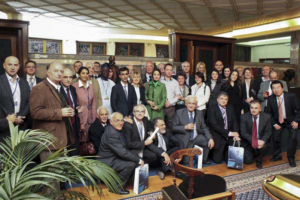The Milankovitch Anniversary UNESCO Symposium on Water Management in Transition Countries as Impacted by Climate Change and Other Global Changes, Lessons from Paleoclimate, and Regional Issue was held in Belgrade from September 3 to 5, 2014.
The symposium was held under the auspices of UNESCO and the Serbian government, coorganized by the Jaroslav Černi Institute for the Development of Water Resources, Water for Sustainable Development and Adaptation to Climate Change Center (WSDAC) and the Serbian Academy of Sciences and Arts, and formally opened by Mr. Tomislav Nikolić, President of the Republic of Serbia. At the opening ceremony, the symposium was additionally addressed by:
- Academician Nikola Hajdin, President of the Serbian Academy of Sciences and Arts;
- Academician Fedor Mesinger, Full Member of the Serbian Academy of Sciences and Arts;
- Prof. Dr. Milan Dimkić, Director General of the Jaroslav Černi Institute for the Development of Water Resources;
- Prof. Dr. André Berger from Université catholique de Louvain, non‐resident member of the Serbian Academy of Sciences and Arts.
The opening ceremony of the symposium was also attended by the Patriarch Irinej of Serbia and Velimir Ilić, Serbian Minister Without Portfolio, responsible for emergency situations.
The plenary session was held on the first day of the symposium, and two separate conferences on
the second and third days:
I. Conference: Water Management in Transition Countries
This conference was held on September 4 and 5, at the Serbian Chamber of Commerce and Industry. It was organized by the Jaroslav Černi Institute for the evelopment of Water resources and WSDAC, in collaboration with the Serbian Chamber of Commerce and Industry.
II. Conference: Past Climate: A Lesson for the Future. Regional Climate Change Aspects
This conference was held on September 4 and 5, at the Serbian Academy of Sciences and Arts. It was organized by the Milutin Milankovitch Opus of the erbian Academy of Sciences and Arts. The symposium was attended by distinguished domestic and international professionals, scientists, academicians and university professors, from Serbia and other countries of the region, as well as from Western Europe, Asia, South America and the USA. Participants also included representatives from, inter alia, the World Bank, the European Commission, regional water management organizations, the Serbian Academy of ciences and Arts, the National Hydrometeorological Service of Serbia and the Jaroslav Černi Institute.
During the course of the symposium, its participants presented the outcomes of their most recent research in the field of water management, as impacted by transition, climate change and other global changes. The main objective of the symposium was to stress the importance of the climate factor on our planet and the significance of the link between climate conditions and water resources, which results in numerous and highly complex impacts of climate change on water
resources management. The symposium also highlighted the impacts that changes associated with transition (social, political and economic) contribute to the challenges of water resources management. The symposium pointed out some of the economic, political and legislative requirements placed before transition countries, while they strive to achieve sustainable management of water resources.
The symposium demonstrated that in order to develop effective water resources management, transition countries need to adequately set objectives, define the achievement timeframe, provide the needed financial and other instruments, and ensure a proper relationship with external institutions and influences. The outcomes of this symposium will be used to define the thematic areas of the 7th World Water Forum, which will be held in Daegu, Korea, in April 2015.

UNESCO Symposium: “Water Management in Transition Countries as Impacted by Climate and Other Global Changes, Lessons from Paleoclimate and Regional Issues”, Belgrade, 3‐5. September 2014. 
UNESCO Symposium: “Water Management in Transition Countries as Impacted by Climate and Other Global Changes, Lessons from Paleoclimate and Regional Issues”, Belgrade, 3‐5. September 2014. 
UNESCO Symposium: “Water Management in Transition Countries as Impacted by Climate and Other Global Changes, Lessons from Paleoclimate and Regional Issues”, Belgrade, 3‐5. September 2014.


